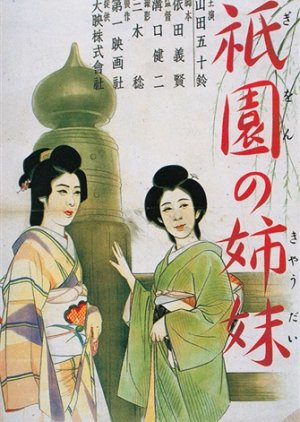- Italiano
- English
- magyar / magyar nyelv
- dansk
- Titolo Originale: 祇園の姉妹
- Conosciuto Anche Come: Gion no Shimai , Geisha Sisters of the Gion
- Sceneggiatore: Yoda Yoshitaka
- Regista: Nomura Hiromasa
- Generi: Vita, Drama, Melodramma
Dove Guardare Sisters of the Gion
Gratis (sub)
Cast & Ringraziamenti
- Yamada Isuzu Ruolo Principale
- Umemura YokoUmekichiRuolo Principale
- Shindo EitaroKudo SangoroRuolo di Supporto
Recensioni

Questa recensione può contenere spoiler
"We live in a fishbowl, and people love to talk."
Sisters of the Gion tackled a familiar subject for this particular era among directors who were critical of the class structure and state of women. Omocho and her older sister Umekichi were geishas who had different approaches to their work. Both thought they knew the best way to navigate their difficult existence. Only time would tell who was right.Umekichi's patron, Furusawa had recently gone bankrupt and left his wife and children. He moved in with the sisters much to the younger sister, Omocho's, chagrin. The more traditional Umekichi felt an obligation to Furusawa. Omocho was the exact opposite. Men used them for what they could get out of them, she felt they should do the same to men. She hated men's predatory behavior and was willing to do whatever was necessary to gain a patron and stable lifestyle. Behind in their rent and unable to buy one good kimono between the two of the them, their new houseguest was a luxury they could not afford. Omocho worked to find both of them patrons and enough money for Furusawa to take the train back to his wife.
In the process of procuring a silk kimono and gaining a patron, Omocho made a dangerous enemy. Umekichi also found out how important she was to Furusawa when his fortunes changed.
Sisters of the Gion was an interesting look at the life of rank and file geishas in a time when their popularity was waning. The sisters were on the bottom rung of society and struggling to make ends meet, depending on men's needs and money to provide for them. Though one sister played by the rules and the other tried to be more independent, both were stuck in a world neither wanted to be in but with very few options for a way out. Director Mizoguchi never candy coated their miserable existence nor did he make Omocho vicious in her intentions. The women were dependent on whatever they could gain from their male clientele, men who could use them or forget them on a whim. It was no wonder Omocho despised the men she had to enthrall in order to eke out an existence. Like everyone she wanted to feel safe, but with her low status that entailed a great deal of risk.
Some of the director's choices could make it hard to connect with the characters. The camera was often set up high and at a distance which made it difficult to see facial expressions. This was complicated even more when a character had their back to the camera. It's not easy to feel empathetic when you can't see how characters are feeling. Fortunately, Yamada made good use of her voice to reel this viewer in. There were only a couple of scenes with a close-up, one put to good use in the final scene when Omocho let loose a tirade of despair and agony too long held back.
Yamada Isuzu had the strongest performance as the modern, more feminist sister bent on securing them a better life. The story gave her plenty to work with. Umemura Yoko was saddled with playing the demure, compliant sister willing to do whatever her former patron needed, making sure he was happy and comfortable even at the loss of her own happiness and comfort. The men came across as largely interchangeable. Given the theme, that may have been by design.
At times cynical, at other times humorous, SotG refused to serve the viewer up a happy or hopeful ending. Despite the sisters' opposing philosophies, both failed. Both suffered. In the end, neither gained anything for their troubles except more trouble. The final scene while cathartic, also came across heavy-handed as the director spelled out his opinion of the sisters' status. Despite the difficult topic, Sisters of the Gion is a film worth seeking out if you like older films and especially this gifted director's works. Sisters of the Gion won the Kinema Junpo Award for Best Film in 1937.
11/10/22
Questa recensione ti è stata utile?
















































